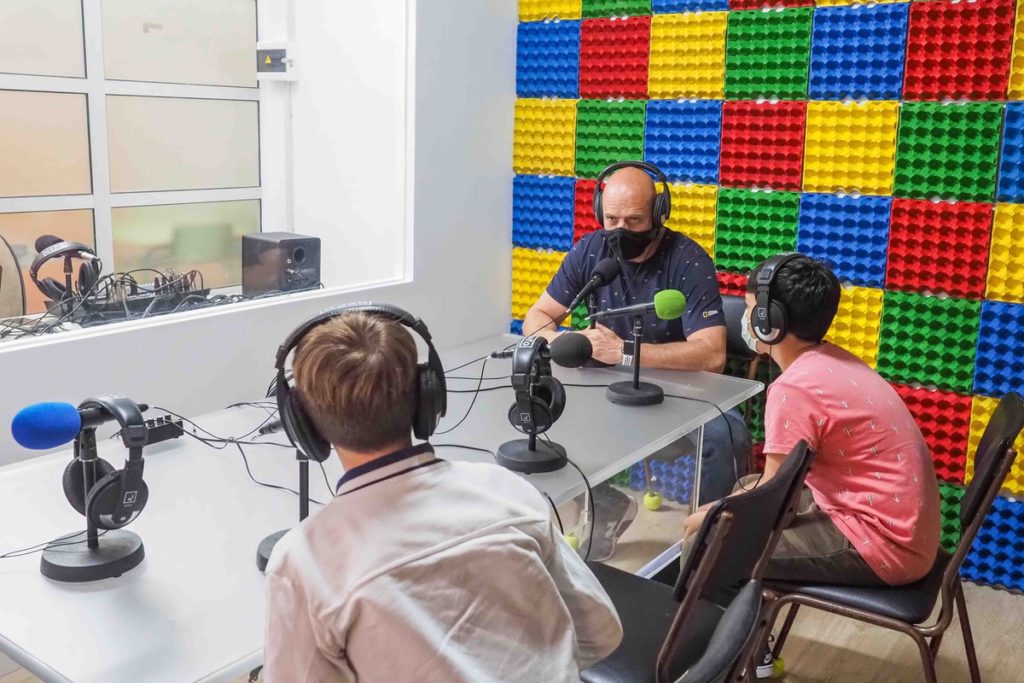
“The microphones are open, so they can’t all speak at once. Remember not to move the papers while you do it and pay attention to the red light”, warns Adolfo. Immediately afterwards, everyone is silent and the teacher raises his finger as a sign of OK: Silence, recording, it is read outside.
Sixth grade students participate in a program on SD Radio, the station of CEIP Santo Domingo, located in La Victoria de Acentejo. Some do it for the first time, like Álvaro. “I’m still shaking,” he confesses on his way out. For others, it is the second experience of him in front of the microphones.
They discuss the environment. Specifically, about the need to remove or not remove plastic bags from supermarkets. Ehedei and Iván are in favor, Álvaro and Raúl, against. Iker moderates. He concludes that both positions are valid and that it is the responsibility of each person to use them. As they leave, they receive congratulations from the director of the center, Natividad Gutiérrez, and Adolfo Alli Delgado, the person in charge of starting up the station, an old and long-awaited project of the educational community of the center that until now had not been able to be faced by not having the financial resources and the trained personnel to take charge of it, but it finally became a reality.
“Adolfo’s arrival at the school changed everything because he gave the teaching staff the bug,” says the director. The teacher, sixth grade and Physical Education tutor, already has experience, because he participated in the radio of the San Fernando school, in the neighboring municipality of Santa Úrsula.
In addition, he is preparing other classmates, because the teachers also need his encouragement, and some sixth-year students to help record the little ones, since the radio is a tool that the whole school uses and enjoys, from first grade to the last year of elementary school.
Training is fundamental, because they do not want the project to be lost. On the one hand, because at this point no one doubts that the radio is an important educational tool that allows group work, encourages participation, promotes school activities from a global perspective, encourages reading, improves language skills and provides extra motivation to students.
In addition, it is an activity in which the entire center participates, always adapting the contents and methodologies to each of the courses. Proof of this is that in Tenerife there are dozens of school stations in schools, with autonomous broadcasting capacity and their own programming.
On the other hand, because it has been an important investment for the school, which had to prioritize resources in order to allocate close to 4,000 euros, in addition to a great effort by the entire educational community that prepared, with a lot of work, a room that was in disused and full of moisture.
The City Council collaborated in the electrical installation and gave them a video camera that allows them to make videos to later post the programs on the school’s blog and share them with the families, while the AMPA La Pedrera bought the loudspeakers.
The janitor and Adolfo painted all the egg cartons red, green, blue, and yellow to soundproof the room, and all the teachers helped put them up afterwards. To this is added the call for a contest to choose the logo, the work of a sixth-grade student, the name of the station and its musical curtain. The inauguration was just a few weeks ago, with an interview with the mayor, Juan Antonio García Abreu, and the Councilor for Works, Juan Ramón Afonso, who were asked how the economy was controlled at City Hall, if the COVID-19 pandemic had changed their way of working, if they would like to change things in the town, what they would do if they were not public officials and what they like most about politics. It was followed by programs to raise awareness of the importance of peace and non-violence, taking advantage of the celebration of this anniversary, on January 30.
The future is to broadcast abroad. “The problem is that we don’t have an antenna -explains Adolfo-, that’s why what we will surely do is link everything to the blog of the Ministry of Education of the Government of the Canary Islands”.
Each teacher takes advantage of the curricular knowledge that he teaches in his subject to apply it to the radio. Behind there is an important work of the students that is reflected in each program. And they themselves verify them. Before making themselves heard with their arguments about the need or not to remove plastic bags, they had to investigate the 2030 agenda and the sustainable development goals. After doing it independently, one day they met by video call, “complying with the COVID health regulations” -Iván clarifies-, to share, explain and select them before exposing them to their listeners. After the debate, one of them did not hide his desire to be a sports journalist in the future. The school radio allows him to take his first steps in the profession that the writer Gabriel García Márquez defined as “the most beautiful in the world”.
But there is still a long way to go. For now, what they have to do is continue learning, sharing and enjoying the radio waves as an excuse.
















